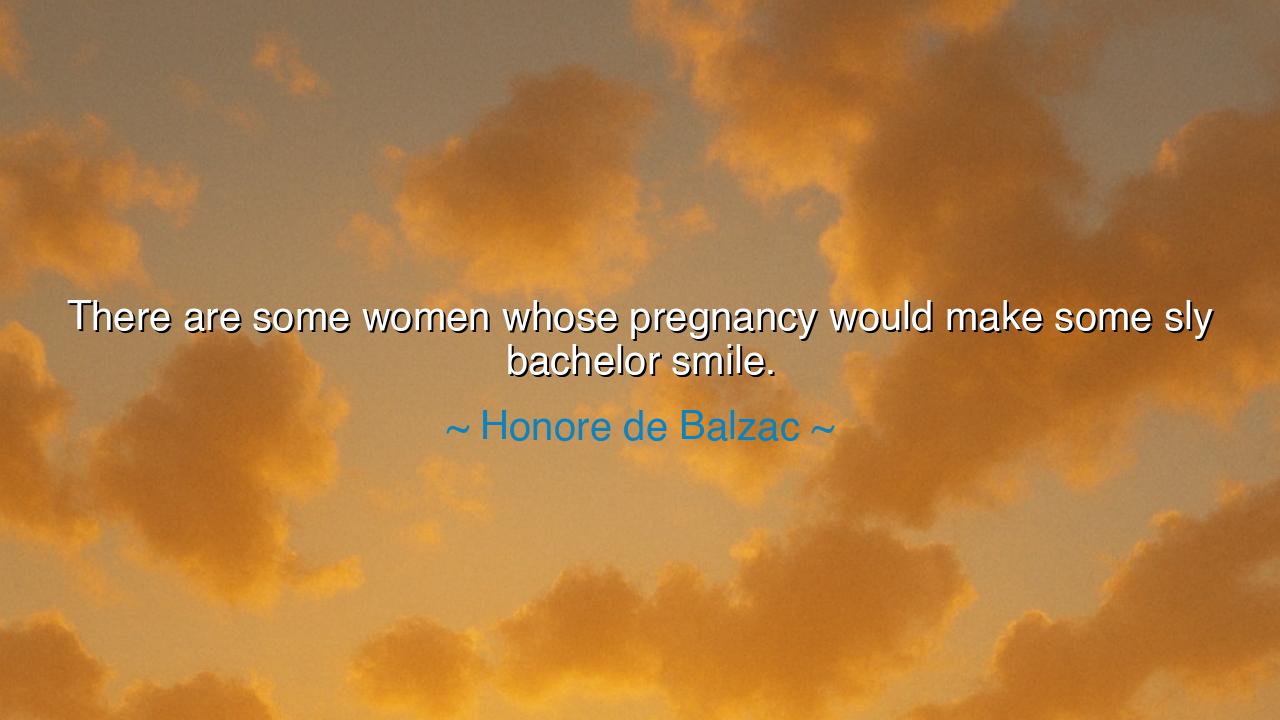
There are some women whose pregnancy would make some sly bachelor






Hear the words of Honoré de Balzac: “There are some women whose pregnancy would make some sly bachelor smile.” At first these words seem laced with mischief, the sharp observation of a man who saw the follies of society as clearly as he saw its virtues. But within them lies a profound commentary on human nature, desire, and the subtle games played between men and women in the theatre of life. The smile of the bachelor here is not of innocence, but of knowing; it is the crooked grin of one who perceives what others pretend to ignore.
Balzac, the great observer of nineteenth-century France, lived in a world of salons, affairs, whispered secrets, and veiled scandals. He knew that the genteel surfaces of society often hid passions that broke every rule of respectability. Thus his words point toward the irony of appearances: a pregnancy, celebrated outwardly as the fruit of marriage and virtue, might sometimes whisper of hidden liaisons, unspoken truths, and the silent satisfaction of those who remain in the shadows. The bachelor’s smile is sly because it recognizes this gap between what is declared and what is lived.
The ancients, too, were not blind to such ironies. In Rome, Augustus sought to restore morality by enacting laws against adultery, yet the poets like Ovid sang of lovers meeting in secret gardens, of married women whose hearts belonged elsewhere. The public life declared virtue; the private life often told another story. And the keen observer, like Balzac or Ovid, could not help but smile at the contradictions of human behavior. It is in these contradictions that we see the frailty—and the vitality—of mankind.
Consider also the tale of King Louis XIV’s court at Versailles. Beneath the splendor of mirrors and gold, the courtiers lived in webs of intrigue. Marriages were political arrangements, yet behind closed doors, passions moved freely. Children born to noblewomen were sometimes less the fruit of their arranged husbands than of their secret lovers. The knowing smile of courtiers was much like that of Balzac’s bachelor—an acknowledgment that what society pretends to sanctify is often tangled with desire, rebellion, and hidden truths.
Yet there is something deeper still. Balzac was not only mocking; he was reminding us that life is rarely as simple as appearances. The pregnancy, symbol of new life and continuation, also reveals the ungovernable force of human passion, a force that cannot always be contained by social rules. The bachelor’s smile is sly because it understands this eternal truth: people will always strive to reconcile duty with desire, often failing, always revealing their humanity in the process.
The lesson for us, then, is to look upon life with both seriousness and humor. We must not be naïve, for the world is full of contradictions and unspoken truths. But neither must we grow bitter. Like Balzac, we should observe with clarity, recognizing the follies and passions of humankind, and perhaps allow ourselves, too, the occasional smile at the ironies of life. For in that smile is wisdom: the acknowledgment that perfection is a myth, and that humanity, with all its flaws, is still worthy of understanding.
So let this wisdom endure: do not be blinded by appearances, nor scornful of human weakness. See clearly, as Balzac did, that behind every façade lies the complexity of the human heart. And when you see the contradictions of the world—when duty and desire collide, when virtue and passion intertwine—learn to meet them not with anger, but with the knowing smile of one who understands that life, in all its mess and mischief, is the true story worth telling.






AAdministratorAdministrator
Welcome, honored guests. Please leave a comment, we will respond soon